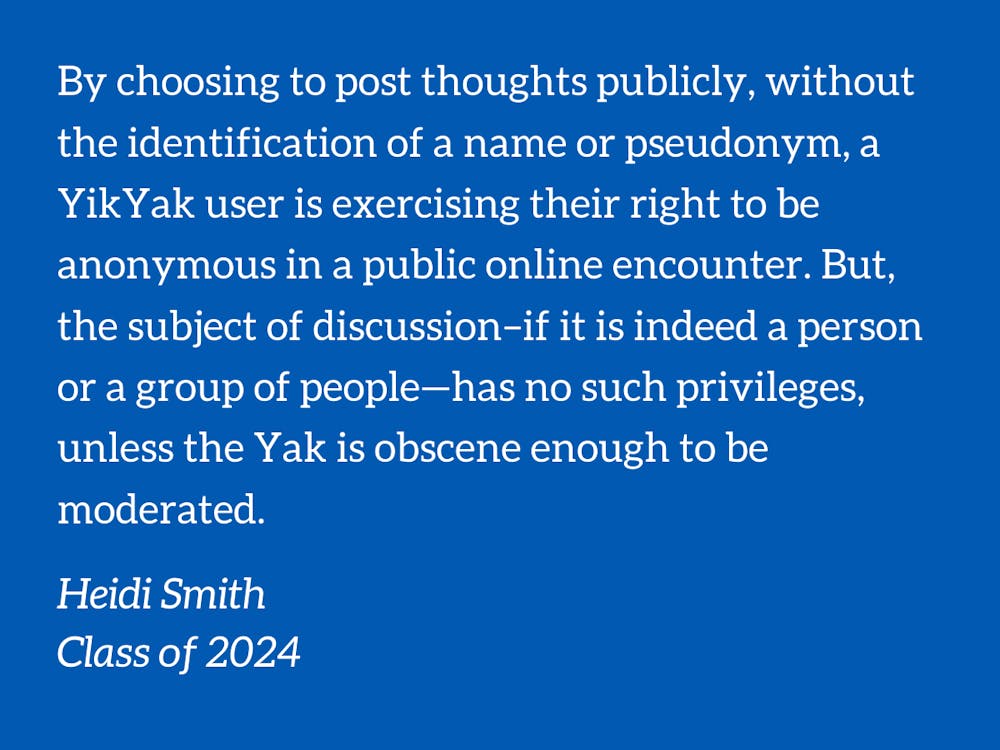While plenty of Duke students have been playing Wordle since its recent inception, a new, less benign manifestation of campus hype has settled upon the new/old app YikYak. The platform began in 2013 and was shut down for the first time in 2017, primarily for bullying and threats of violence. Now that it has entrenched itself back within the university milieu, the questions remain as to how long it can last this time, and whether it should exist at all.
The app can end one of two ways; either it becomes irrelevant to its users, or it is again shut down. YikYak prides itself on the value of free speech. It also inherently protects the privacy of its users, having no identification save for a little emoji icon to distinguish commenters. But if threats to real life, physical safety are made, that privacy can be rescinded.
In my high school history class, we settled on the idea that your own freedom ends where someone else’s begins. Now, that isn’t the end-all, be-all interpretation of the first amendment—or any of them—but it’s a good starting point. By choosing to post thoughts publicly, without the identification of a name or pseudonym, a YikYak user is exercising their right to be anonymous in a public online encounter. But the subject of discussion–if it is indeed a person or a group of people—has no such privileges, unless the Yak is obscene enough to be moderated.
This type of interaction, that of public anonymity, is markedly different from normal encounters, both public and private. Most online social media interactions belong to the public sphere, even if your account is set to private, due to the identifiability and scope of visibility. Private online interactions would be those of private messaging and calling, wherein you personally know the people with whom you are communicating.
YikYak exists somewhere in between. Anyone is able to access Yaks, as long as they are located within five miles of the OP or if the college is one of the featured schools of the day. But unless specified via some other platform or forcibly revealed by law enforcement, the identities of users are kept private. In fact, the only way to register for the app is with a phone number, so even the company ostensibly does not know your name—unless they need to.
There do exist such spaces with a positive benefit. One semi-public, semi-anonymous space is Ed (or Piazza). Students can ask questions privately (to instructors) or publicly (to the whole class) and can be anonymous or identified by name. Considering the Percentage Project at Duke found that 65% of women and 29% of men wouldn't post on a class forum if not for anonymous options, clearly there are benefits and necessities to having anonymity. It can allow students to feel more comfortable engaging in course material when there is not a—founded or not—risk of looking unintelligent or needy. Further, if the poster’s identity was revealed, there would seldom be repercussions, unlike for some particularly inappropriate Yaks.
Then, it seems the appeal of YikYak, as opposed to perhaps Twitter, lies in its safety net. If you post something unfunny, then it will not rise to the top of the trending page and no one will be any the wiser. If you post something uncouth, you cannot be publicly shamed. And if you do make a successful Yak, then there exists the possibility of bragging to friends about your success.
Many Yaks are simply Tweet-like quips which garner more attention from their Duke-specificity: complaining about the heaviness of WU doors, commenting upon Covid policies or joking about different majors. But not all are so harmless, whether by their sexual nature, concern for the poster’s wellbeing or notably, commentary upon a person or group of people on campus.
Thus, there are many instances where this public anonymity gets hairy. For one, without identity, there is less room to determine the appropriateness of a poster’s Yak. I’ve observed several jokes that imply or explicitly state a facet of the OP’s identity. The jokes are hinged upon the user actually having that identity, (e.g., gender, racial group, SES) but could in reality be made by anyone. A man could conceivably think of a Yak which jokes at the expense of women, post it and be rewarded with upvotes from girls who relate.
And since everyone is hiding behind a screen, content is the only marker of success, and who the content creator is is rendered superfluous. Identity politics cannot be policed in absence of identity. Cancel culture is clearly not a good thing, but in the lack of peer-policing, can individuals self-regulate their own online interactions?
Further, there become groups which are deemed worthy of degradation or seemingly benign commentary. As of late, sororities, ROTC kids and WU workers have been noticed by the herd. Presumably no one wants to be outed for doing PDA on campus or performing their job to the best of their ability, but do random students and staff members with implied identifiability want to receive unsolicited comments which are neither compliment nor threat?
Why should people have the right to anonymously talk about other people in the digital public space when that takes away the right for others to live their unmediated lives without fear of their privacy being encroached upon? At a certain point, you can’t have your cake and eat it too. Like a forum post, anonymity should be exercised for privacy and peace of mind, not for degradation or invasion of privacy. In other words, if you wouldn't feel comfortable Tweeting it, you probably shouldn’t Yak about it. Otherwise, it can turn into a selfish, indulgent joke at the expense of others, with the luxury of self-privacy.
Heidi Smith is a Trinity sophomore. Her column runs on alternate Wednesdays.
Get The Chronicle straight to your inbox
Signup for our weekly newsletter. Cancel at any time.

